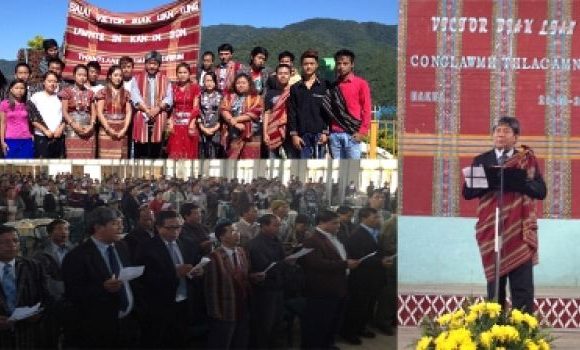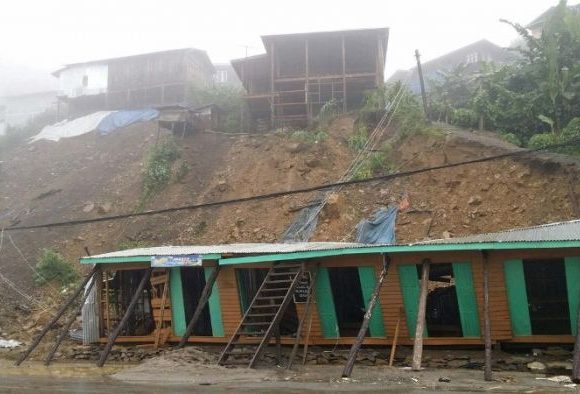Giving peace a chance in Burma

21 September 2013: The theme for International Peace Day for 2013 is ‘Education for Peace’. When wars break out, armed conflict is destroying not only schools but the hopes and ambitions of generations of children.
An important starting point for conflict prevention and peace making is education, unnecessarily limited for children and youth only but for adults too. What people are taught and how they are taught can make a nation more or less prone to conflict. How aware one is to the situation of one’s nation situation also lean much on how much s/he knows her/his rights.
A holistic approach to lasting and just peace will be different as contexts differ. But for Burma, our history is replete with fighting for freedom, peace and justice. The first was the struggle against the British and Fascist colonizers, while the second is the struggle against homegrown military dictatorship for six decades. The ethnic nationalities along Burma’s peripheries have spent more than half a century fighting the regime for autonomy and equal treatment. The result has been uncountable damage to national development, generations of citizens, especially the youth raised in an atmosphere of fear, distrust, and above all uninformed.
Undeniably, Thein Sein’s administration’s ceasefire agreements with ethnic national revolutionary groups have received remarkable international attention. Some believe that Burma is on her way back to democracy that it had lost sixty years ago, which is not a U-turn. On the other hands, longtime Burma watchers agree that a lasting resolution of ethnic conflicts requires more than forging ceasefires or just an absence of war. The peace process in Burma is just still in the step at ‘just give it a try to trust’ level. The urge to depend more on intellectual consideration and exercise one’s intelligence and compassion becomes less when lethal weapons are still in one’s hands.
The ethnic nationalities have been fighting for peace, which is not just merely an absence of war or what scholars of peace call it negative peace. They have been fighting for a long lasting just and positive peace, which guarantees the presence of justice and equality at all levels (economic, social, and political) and the shared democratic use of power; and non-violence. The peoples have been fighting to get freedom from Negative Freedom such as Freedom from War, Freedom from Fear, Freedom from Hunger, Freedom from Violence against Women, Freedom from Poverty, Freedom from Oppression, Torture, Persecution and Discrimination.
The country already sacrificed too many lives, too many hearts and natural resources; and now is the time to put a stop to this civil war, sectarian and communal conflicts through a peaceful means: through a negotiated-settlement; and through a well-mannered and all-encompassing dialogue. The solution to achieve peace through dialogue and negotiated-settlement is nothing but peace, respect and a harmonious colorful community. Violence, direct violence, structural violence and cultural violence has never been the answer. We need the basic level of practical knowledge and sound and prudent judgment based on a simple perception of the situation or facts that we all need to help us live in a reasonable and safe way. Not all things are true as men die for.
Of knowing the freedom to control and direct one’s own life and respect the rights and freedom of fellow citizens, an informed and good citizen can exercise freedom more suitably. Positive freedom, an exercise of concepts, allows a man to consciously exercise not just his rights but to be a responsible citizen to fully take care of his duties. Knowing one’s rights and responsibilities and duties is power itself. Thus, for Positive Peace and Freedom, all are required to realize their power – People’s Power. The more informed we are, the better we will exercise our power.
“Democracy” would only truly work when everyone, regardless of their ethnicity, religion, color and stance, has an equal level of knowledge of ‘democratic’ practices. Everyone deserves to have their voices heard and thoughts expressed. All individuals deserve to be valued equally, have equal opportunities, and not be discriminated against because of their race, religion, ethnic group, gender or sexual orientation. Everyone deserves to have a country to call ‘my nation’ in which there is full exercise of mobility rights. Everyone deserves to hold firm her or his own belief as truth. Every kid above five years old deserves to sit and learn in a classroom instead of working outside and running around battle fields. Every woman deserves to live in patriarchy-free zones.
As a human, Human Rights are ours. We don’t have to buy them, nor apply for them, nor permission to have them. They are just ours, no matter who we are, where we are from, how old we are, or anything else. They are just simple. Now some people may try to ignore our rights or violate them or pretend they don’t exist but they can’t change the facts that they are ours. No one can take away your human rights. Human rights are inscribed in the hearts of people; they were there long before lawmakers drafted their first proclamation.
One more thing, rights always come with responsibilities and duties. It is an obligation to exercise these rights and obey the just-law. A democracy in which the only parts ordinary people play are casting blind or bribe-motivated votes and demonstrating is far from the true spirit of democracy; it is only a variant form of people-based oligarchy.
Until and unless the majority learns to protect the minorities, democracy will be just a vague political terms for the persecuted. If the majority denies the rights of minorities, then they also destroy democracy. Collaborative efforts contributed by all parties involved for a common constructive goal are more essential to the improvement of a country than a ‘replica’ of elites’ democracies, which are often misrepresented and conceptualized as effectively responding to the majority’s demand.
Peace is what we are. It is only our ‘mind’ which is capable of ‘understanding’. Peace can only be attained through understanding. How can there be understanding if we do not talk and listen to one another? How can there be conversation if one partner is dumb in the mind? Now is a high time for us to start ‘Trying and Trusting’ to give peace a chance.
By Khen Suan Khai






